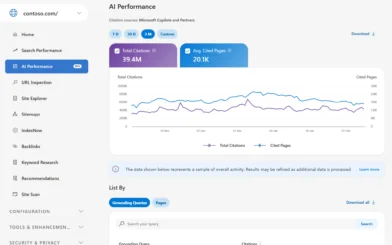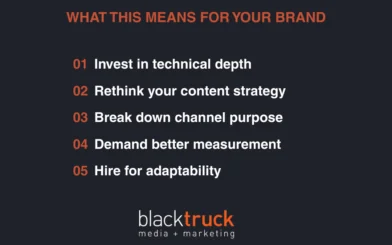Artificial intelligence (AI) isn’t new: humans have been using this revolutionary technology for years now, whether we’ve accessed a customer support chatbot or ridden in a self-driving car. However, the introduction of ChatGPT is drastically changing the AI landscape – especially when it comes to content marketing and SEO. This tool’s ability to answer questions, brainstorm ideas, and generate content on just about anything can be advantageous to marketers, but it doesn’t come without its drawbacks. There are certainly ways for SEOs to use ChatGPT ethically and effectively, but where do we draw the line?
An Overview
How is ChatGPT Bad for SEO?
- Database is pre-2021, limiting application for current topics
- Factually-unreliable for content generation
- Sometimes struggles to write conversationally and intuitively
- Purely AI-generated content could be treat as webspam by Google
How is ChatGPT Good for SEO?
- Fast and efficient for simple research tasks
- Speeds up content ideation process
- Effective at summarizing large bodies of content
What is ChatGPT?
Launched by OpenAI in November 2022, ChatGPT is a natural language chatbot built with the intention of answering any question a human asks through a dialogue format. By utilizing human AI trainers and methods from similar model InstructGPT, OpenAI conditioned the platform to address instruction-based prompts with relevant, detailed responses. ChatGPT is constantly learning, with its millions of users being able to provide feedback on answers that help deepen the bot’s knowledge base. The platform’s ability to build on itself means its potential can only grow, which is why it’s so important we understand its value now.
What is ChatGPT Used For?
The many uses of ChatGPT are what’s so intriguing about it – in under a minute, the chatbot can provide both a list of recipes using grilled chicken and code for the backend of a website. ChatGPT is such a game-changer in the AI space because of its versatility: for the first time ever, one platform can instantly solve the queries of almost everyone, from healthcare professionals to accountants. By inputting one specific question, users can get ChatGPT to easily generate medical reports, financial advice, and more. ChatGPT is free to use, so personally taking the time to make an account and play around with queries is a great way to grasp exactly what the chatbot can do.
For marketers and SEOs specifically, ChatGPT is best used for content ideation and development. The platform can easily list dozens of blog topics within niche industries for a specific audience, as well as create a meta description based solely off of a URL. ChatGPT is a great remedy to writer’s block and can provide a helpful starting point for a variety of projects. However, despite the chatbot’s widespread knowledge and convenience, it can’t accurately answer every question it’s presented with. ChatGPT is an idea generator, not a fact generator, and users should be aware of its downsides before trusting its every output.
What Are the Drawbacks of ChatGPT?
Even though ChatGPT seems shiny and exciting, its limitations are worth considering before diving head-first into the platform. For one, ChatGPT’s knowledge is still limited to 2021 and earlier, meaning it cannot access any news or updates that have occurred after then. For this reason, users should be wary of using the platform to seek out factual information; if asked who occupies the royal throne, ChatGPT will answer with Queen Elizabeth II – despite her death in 2022. The bot does openly acknowledge this barrier when answering queries about 2022 and beyond, but it also occasionally “writes plausible-sounding but incorrect or nonsensical answers.” OpenAI has shared that when ChatGPT is unable to answer a query, it will make up facts, quotes, and sources (even fake URLs) before telling the user it cannot accurately respond. Rather than regarding the chatbot as an all-knowing wealth of information, try to think of it as your smart friend who often has the answers to your questions, but whom you’d still want to fact-check.
One of the biggest drawbacks of ChatGPT for content marketers in particular is the platform’s inability to provide human-like writing. We know that we’re working with AI here, so it should not come as a surprise that ChatGPT is unable to pick up on context, misses conversational cues, and goes off on wordy tangents. These downfalls can create a noticeable disconnect between a piece of content and its readers, as people typically prefer engaging and personable writing from brands. This is one area where ChatGPT cannot deliver, which is a major reason why content writing must continue to be largely done by humans.
What Does ChatGPT Mean for SEOs?
Content and SEO efforts require a lot of time and thought, which is why many marketers see the introduction of ChatGPT as a way to streamline writing processes and cut down on the resources needed to drive results. AI presents opportunities to the industry in this way, as the time spent ideating blog topics and structuring website content can be cut down significantly by ChatGPT. However, it presents an ethical dilemma of where to draw the line: should AI be used for content ideas and outlines only, or is it okay to workshop a blog that has been AI-generated?
There’s no one right answer, but it’s important that SEOs see ChatGPT as a supplement to the work we do and never as a replacement. Drafting a piece of content is often the easiest part of a marketer’s job; there are significant steps SEOs take before writing begins – research, strategy, etc. – that ChatGPT cannot do. Content that’s ultimately written and proofed by humans is more engaging, original, and ethical than what ChatGPT can provide. AI writing often does not meet E-E-A-T standards, which are Google’s guidelines for quality content based on a piece’s level of expertise, experience, authoritativeness, and trustworthiness. Content generated by ChatGPT can be seen as plagiarized or spam by Google, which limits its ability to rank on search engine results pages (SERPs) and therefore perform well.
As ChatGPT continues to become more widely used in the industry, there are a number of ways marketers can respond to its rapid growth. Our understanding of ChatGPT allows us to educate clients or agency partners on the benefits and drawbacks of the platform, as well as how to ethically use it. Not everyone understands the issues behind using AI for complete content generation, so SEOs should be vigilant with the content they receive from others. For suspicions of AI plagiarism, content can be run through ZeroGPT, a free tool that can detect text from OpenAI – and, don’t hesitate to drop a hint by sending this blog link.
This is just the beginning of AI’s relevance within content marketing, so it’s crucial that SEOs stay on top of trending tools and understand how to best use them now. ChatGPT is great to tap for assistance with creating a blog outline or structuring a webpage, but it doesn’t come without its challenges. This chatbot isn’t an answer engine – we can’t trust its results like we do Google’s – but when paired with a human brain, it can bring great success.
For more insights on how ChatGPT can be leveraged for SEO, or how marketers can continue creating quality content in an AI-dominated world, contact us – we’re always open to chat.



